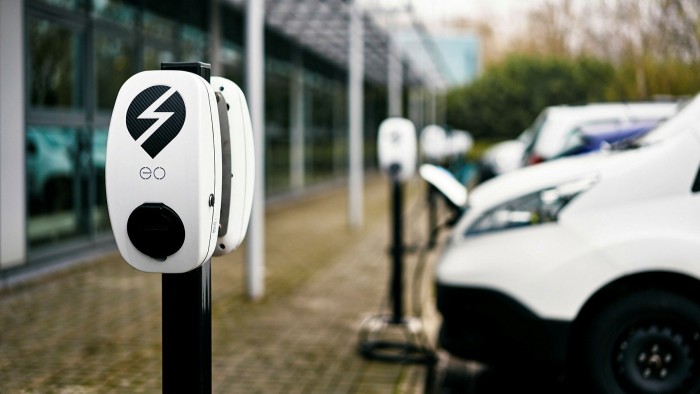Car charging start-up EO dumps Spac for private funding

Simply sign up to the Electric vehicles myFT Digest -- delivered directly to your inbox.
EO, a British provider of electric vehicle charging to companies such as Amazon and Tesco, is close to securing private funds to back its expansion into the EU and US after a failed attempt to float in the US through a Spac.
EO was forced this year to ditch a $675mn deal to combine with First Reserve Sustainable Growth, a New York-listed special purpose acquisition company. The move came as the war in Ukraine and wider slump in tech-related stocks caused the market for Spac backed flotations to freeze.
Charlie Jardine, who founded EO Charging in 2014, said it had been a “challenging time to go public” but that the collapse of the deal now looked like a “gift”.
Jardine, who declined to comment on the identity of the new investor before the deal concludes, said the money would allow the company to expand in Europe, including a new headquarters in Germany, as well as roll out services in the US.
“It’s probably a blessing in disguise being private for a few reasons. We don’t have the commitments around being a public company and can actually focus on executing the plan.”
EO provides charging points and services to companies that own fleets of electric vans and trucks such as Amazon, DHL and various supermarkets, and is looking to expand in areas such as electric buses.
The North American market would be a key focus in future, he added, given the market there was lagging behind Europe and expected to grow quickly given the interest among large US companies.
EO made about £19mn in revenue in 2021, doubling its tally for the year before. It made a loss of £3mn on an earnings before interest, depreciation and amortisation basis, with projections to become profitable at this level in 2023, according to an investor presentation seen by the Financial Times.
Jardine added that there were no more plans to go public in the near future.
“The public market is definitely not going to suddenly get better,” he said, pointing to the slump in valuations of listed rivals. “It’s going to probably be a bit of a challenge for some time. Anyone who is in EV, automotive or technology is probably taking a pounding.”
Jardine also warned that the UK market was set for a period of turbulence from next week when new regulations over EV chargers are brought in.
These will bring in rules over permitted charging times and the requirement for smart chargers to be fitted. The aim is to reduce load impact on the grid by setting the default to no access during peak times for charge points at offices or depots.
Although this can be overridden, the process will become more complicated, and potentially more costly, which has raised fears that the confusion could set back company plans to install chargers.
EO is bringing out its own range of smart chargers but Jardine warned that the confusion could be a setback for the sector.
EO surveyed more than 500 UK fleet managers and found that almost half were unaware of the change or failed to understand it. A quarter worried that the new smart charging regulations would raise the cost of running EV fleets, while more than half said changes to grants and regulations in the UK had led to higher implementation costs.
Comments